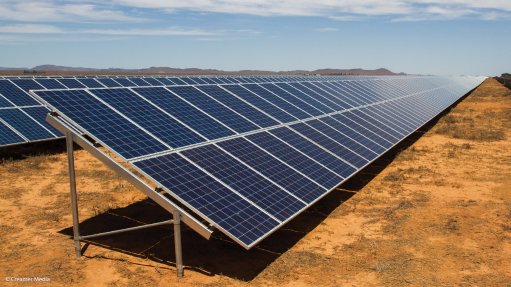
Photo by: Creamer Media
African countries should aim to invest 25% of their Covid-19 stimulus budgets in renewable energy, Sustainable Energy for All CEO Damilola Ogunbiyi said on Wednesday, noting that renewable energy had emerged as the cheapest source of new electricity for most countries on the continent.
Speaking during a high-level political forum hosted by the International Renewable Energy Agency (Irena), Ogunbiyi argued that the pandemic presented a “once-in-a-generation opportunity” for African governments to reset their economies by improving energy access through large-scale investments into both centralised and decentralised renewables solutions.
The benefits of prioritising sustainable energy, she added, would arise in the form of higher growth, new jobs and industries, improved healthcare and higher agricultural and manufacturing productivity.
In a recently published report, Sustainable Energy for All calculated that for every US dollar invested in the transition towards renewable energy, an additional $0.93 of gross domestic product (GDP) would be generated above a business-as-usual trajectory.
The report also noted that each $1-million invested in large-scale solar generation projects created about 80 jobs, while some 25 jobs were supported for every 1 000 customers connected to a decentralised energy grid.
Ogunbiyi also highlighted the gender-equity spinoffs from African electrification schemes, reporting that wages for women with access to energy were 59% higher than those without, a gain that put those women on an equal wage footing with their male counterparts on the continent.
Large-scale investments in solar, hydro, wind and geothermal could also drive the development of upstream value chains, enabling African countries to build local manufacturing or assembly capacity.
“We could imagine countries localising 30% of their associated value chains and simultaneously developing greater energy security,” she said.
In his presentation, Irena director-general Francesco La Camera reiterated the agency’s call for renewable energy to be placed at the centre of the economic recovery efforts being introduced by government in response to the Covid-19 pandemic.
He said a doubling of energy transition-related investments to $2-trillion a year between 2021 and 2023 would boost global GDP by 1% more than would be the case should countries persist with their current investment plans.
Such investment would also result in about 4.5-million more net jobs in the energy sector, even when taking account of the loss of jobs that would occur in the fossil-fuel sector.
“Every $1-million invested in the energy transition will give 25 jobs, which is three times the number of jobs we can get if we invested the same $1-million in traditional plants,” La Camera said.